Hot Fuzz took me a while to really, really appreciate, but it a very lengthy yet brilliant film. In some ways it is better than Shaun of the Dead, which is still one of my favorite films. Great review, Gideon. I'm assuming you just saw this recently for the first time?
Gideon58's Reviews
→ in Movie Reviews
Yes, watched it yesterday for the first time, people on this site talk about it all the time and I thought I should check it out. When I saw what the film was about, I remembered how much I enjoyed Zombieland and decided to watch.
X
Favorite Movies
X
User Lists
Logan Lucky
Steven Soderbergh, who directed the George Clooney version of Ocean's 11, scores with the similarly-themed heist comedy called Logan Lucky, which features the same overly complex plotting, colorful characters, and stylish camera work of his 2001 film, with just enough tweaks to the story that's it not just a Danny Ocean rehash.

This 2017 film stars Channing Tatum (who Soderbergh directed in Magic Mike) plays Jimmy Logan, a laborer who gets fired from his job and asks his brother (Adam Driver) and sister (Riley Keough) to help him rob the giant vault at the Charlotte Motor Speedway, the home Nascar racing. Their plan to blow the vault requires the assistance of a famed safe-cracker named Joe Bang (Daniel Craig) who is already serving time. Our crew has to break Joe out of prison, blow the vault, and return Joe to prison before anyone notices, not to mention getting Jimmy to his daughter's beauty pageant on time.

Yes, what Soderbergh gives us here is a sort of rural re-working of Ocean's 11, except for the fact that most of the Logan crew are not professionals, with the exception of Joe Bang, the character who really gave this film the dash of originality that separates Jimmy Logan from Danny Ocean. First of all, who knew that the home of Nascar had a giant vault on the premises? And Danny never had to break a member of his crew out of jail and return him to jail. This was probably the most amusing part of the story, the temporary liberation of Joe Bang, despite the fact that I don't believe this could actually happen. I bought the way Joe was removed from the facility I just had a hard time believing that no one in the prison caught his absence, no matter what distractions were provided, headcounts in prison are too frequent for an absence con to go unnoticed. On the other hand, I didn't like the addition plot complication of having to change the date of their original plan. Then this has always been an element of the Soderbegh movies, the plan being changed or challenged in some way before it's actually executed.

Soderbergh's camerawork is exemplary here, almost tiring the viewer in having to frequently crane his neck to keep track of what is going on and just like the 2001 film, there is so much going on that it's hard to keep track of everything, but in interest of keeping my eye on the prize, there were holes and plot elements that got by me that would hopefully be caught in a rewatch.

Soderbergh does some interesting casting here...Channing Tatum is completely de-glammed and almost unrecognizable as Jimmy Logan, a role he effectively underplays in the tradition of George Clooney as Danny Ocean. Adam Driver was a lot of fun as Jimmy's one-armed brother and Daniel Craig absolutely lights up the screen as Joe Bang. Dwight Yoakum also brought the proper greasiness to his role as the prison warden like he did in Sling Blade, a razor sharp casting decision from Soderbergh, like Carl Reiner in 2001. Production values are first rate and the similarities to the first Danny Ocean movie cannot be ignored, but there is fun to be had here.
Steven Soderbergh, who directed the George Clooney version of Ocean's 11, scores with the similarly-themed heist comedy called Logan Lucky, which features the same overly complex plotting, colorful characters, and stylish camera work of his 2001 film, with just enough tweaks to the story that's it not just a Danny Ocean rehash.

This 2017 film stars Channing Tatum (who Soderbergh directed in Magic Mike) plays Jimmy Logan, a laborer who gets fired from his job and asks his brother (Adam Driver) and sister (Riley Keough) to help him rob the giant vault at the Charlotte Motor Speedway, the home Nascar racing. Their plan to blow the vault requires the assistance of a famed safe-cracker named Joe Bang (Daniel Craig) who is already serving time. Our crew has to break Joe out of prison, blow the vault, and return Joe to prison before anyone notices, not to mention getting Jimmy to his daughter's beauty pageant on time.

Yes, what Soderbergh gives us here is a sort of rural re-working of Ocean's 11, except for the fact that most of the Logan crew are not professionals, with the exception of Joe Bang, the character who really gave this film the dash of originality that separates Jimmy Logan from Danny Ocean. First of all, who knew that the home of Nascar had a giant vault on the premises? And Danny never had to break a member of his crew out of jail and return him to jail. This was probably the most amusing part of the story, the temporary liberation of Joe Bang, despite the fact that I don't believe this could actually happen. I bought the way Joe was removed from the facility I just had a hard time believing that no one in the prison caught his absence, no matter what distractions were provided, headcounts in prison are too frequent for an absence con to go unnoticed. On the other hand, I didn't like the addition plot complication of having to change the date of their original plan. Then this has always been an element of the Soderbegh movies, the plan being changed or challenged in some way before it's actually executed.

Soderbergh's camerawork is exemplary here, almost tiring the viewer in having to frequently crane his neck to keep track of what is going on and just like the 2001 film, there is so much going on that it's hard to keep track of everything, but in interest of keeping my eye on the prize, there were holes and plot elements that got by me that would hopefully be caught in a rewatch.

Soderbergh does some interesting casting here...Channing Tatum is completely de-glammed and almost unrecognizable as Jimmy Logan, a role he effectively underplays in the tradition of George Clooney as Danny Ocean. Adam Driver was a lot of fun as Jimmy's one-armed brother and Daniel Craig absolutely lights up the screen as Joe Bang. Dwight Yoakum also brought the proper greasiness to his role as the prison warden like he did in Sling Blade, a razor sharp casting decision from Soderbergh, like Carl Reiner in 2001. Production values are first rate and the similarities to the first Danny Ocean movie cannot be ignored, but there is fun to be had here.
Last edited by Gideon58; 02-12-19 at 01:17 PM.
X
Favorite Movies
X
User Lists
I've been letting myself get so far behind that there's too much to comment on. A Star is Born is finally coming to dvd Tuesday.
X
Favorite Movies
X
User Lists
At Eternity's Gate
Willem Dafoe received his fourth Oscar nomination and his first for Outstanding Lead Actor for his performance in 2018's At Eternity's Gate, a slightly pretentious, but handsomely mounted look at the artist Vincent Van Gogh, that takes a pointed look at the demons that tormented the celebrated artist, most importantly, did his talent match his passion.

The film opens with the artist taking a self-imposed exile to secluded areas in France called Arles and Auvers-Sur-Oise, where the artist seems to remove himself from reality and avoiding human contact if at all possible as he finds the privacy to pursue his passion, but finds his work conflicting with issues of religion and mental illness that find him and many others questioning his sanity. Of course, the film also looks at the relationship with his brother Theo and with fellow artist Paul Gaugin, who were apparently the only people with whom Vincent could communicate.

Let me start off by saying that I know little or nothing about art, Van Gogh, and have never seen any of the other films about him, the most famous of which is probably the 1956 melodrama Lust for Life that starred Kirk Douglas as Van Gogh and won Anthony Quinn an Oscar for his Paul Gaugin. Director and co-screenwriter Julian Schnabel (The Diving Bell and the Butterfly) has crafted a richly textured look at this tortured soul that displays reverence to its subject, but doesn't blindly protect whatever images there are out there about him.

The first scene between Vincent and his brother Theo, sensitively portrayed by Rupert Friend, suggests an almost incestuous overtone to their relationship. Vincent is ill and when Theo arrives, he climbs into bed with his brother and Vincent says that if he's going to die, he would like it to be in his brother's arms. There's a disturbing scene that starts at the film's opening and is revisited and concluded later where Vincent asks a young woman to pose for him and he gets very physical with her when she has trouble understanding exactly the way he wants her to pose.

What really seems to be Schnabel's underlying theme in presenting this artist's story is the possibility that as much as Van Gogh loved to paint, he might not have been very good at it. Prior to this film, I never knew that Van Gogh only sold a single painting during his lifetime. He seems to look for approval and validation of his talent through his relationship with Gaugin which he never really gets. It's also revealed that Gaugin was the real reason Van Gogh cut off his ear. I was pleased that Schnabel had the taste to have this happen off screen. Vincent always said he had to paint fast and catch the subject as quickly but Paul said it was more important to check the condition of the surface you're painting on which seemed to be the genesis of their never ending conflict. We also learn that Van Gogh was institutionalized twice and I have never seen this happen in a movie before, but during his second incarceration, he is released early because the staff feel there is nothing they can do to help him.

The real selling point of this movie is the delicately layered performance by Willem Dafoe that rivets the viewer to the screen and makes this movie seem a lot better than it really is. Few actors play unhinged better than Dafoe and he gets ample opportunity to prove that here, whether terrorizing and being terrorized by a group of school children, or trying to validate his existence to a priest, beautifully played by Mads Mikkelsen, Dafoe quietly and powerfully demands viewer attention and never makes the viewer regret this sometimes, slow, but ultimately rewarding film experience and with someone other than Dafoe in the starring role, I would have taken half a bag of popcorn off this rating, but Dafoe alone raises the bar on this one.
Willem Dafoe received his fourth Oscar nomination and his first for Outstanding Lead Actor for his performance in 2018's At Eternity's Gate, a slightly pretentious, but handsomely mounted look at the artist Vincent Van Gogh, that takes a pointed look at the demons that tormented the celebrated artist, most importantly, did his talent match his passion.

The film opens with the artist taking a self-imposed exile to secluded areas in France called Arles and Auvers-Sur-Oise, where the artist seems to remove himself from reality and avoiding human contact if at all possible as he finds the privacy to pursue his passion, but finds his work conflicting with issues of religion and mental illness that find him and many others questioning his sanity. Of course, the film also looks at the relationship with his brother Theo and with fellow artist Paul Gaugin, who were apparently the only people with whom Vincent could communicate.

Let me start off by saying that I know little or nothing about art, Van Gogh, and have never seen any of the other films about him, the most famous of which is probably the 1956 melodrama Lust for Life that starred Kirk Douglas as Van Gogh and won Anthony Quinn an Oscar for his Paul Gaugin. Director and co-screenwriter Julian Schnabel (The Diving Bell and the Butterfly) has crafted a richly textured look at this tortured soul that displays reverence to its subject, but doesn't blindly protect whatever images there are out there about him.

The first scene between Vincent and his brother Theo, sensitively portrayed by Rupert Friend, suggests an almost incestuous overtone to their relationship. Vincent is ill and when Theo arrives, he climbs into bed with his brother and Vincent says that if he's going to die, he would like it to be in his brother's arms. There's a disturbing scene that starts at the film's opening and is revisited and concluded later where Vincent asks a young woman to pose for him and he gets very physical with her when she has trouble understanding exactly the way he wants her to pose.

What really seems to be Schnabel's underlying theme in presenting this artist's story is the possibility that as much as Van Gogh loved to paint, he might not have been very good at it. Prior to this film, I never knew that Van Gogh only sold a single painting during his lifetime. He seems to look for approval and validation of his talent through his relationship with Gaugin which he never really gets. It's also revealed that Gaugin was the real reason Van Gogh cut off his ear. I was pleased that Schnabel had the taste to have this happen off screen. Vincent always said he had to paint fast and catch the subject as quickly but Paul said it was more important to check the condition of the surface you're painting on which seemed to be the genesis of their never ending conflict. We also learn that Van Gogh was institutionalized twice and I have never seen this happen in a movie before, but during his second incarceration, he is released early because the staff feel there is nothing they can do to help him.

The real selling point of this movie is the delicately layered performance by Willem Dafoe that rivets the viewer to the screen and makes this movie seem a lot better than it really is. Few actors play unhinged better than Dafoe and he gets ample opportunity to prove that here, whether terrorizing and being terrorized by a group of school children, or trying to validate his existence to a priest, beautifully played by Mads Mikkelsen, Dafoe quietly and powerfully demands viewer attention and never makes the viewer regret this sometimes, slow, but ultimately rewarding film experience and with someone other than Dafoe in the starring role, I would have taken half a bag of popcorn off this rating, but Dafoe alone raises the bar on this one.
X
Favorite Movies
X
User Lists
I haven't yet seen the film. But if anyone were ever born to play Van Gogh, then it would be Dafoe.
You mentioned Lust for Life, which was an impressive film when it came out in 1956, both for it's subject matter, and the stellar performances by Douglas and Quinn.
There is some pretty trustworthy biographical material available concerning Van Gogh. He had a tortured life because he started out nuts, then got worse. But as a painter, he's top 25 stuff.
IMO Julian Schanbel, as a painter, is a second rate artist with a first rate reputation. He's entitled to his opinions about Van Gogh's works. But if you put the two artist's work side by side it would be obvious who the real talent is.
As a film director he may be wonderful. It'll be interesting to see what he's done with this very familiar subject matter.
~Doc
You mentioned Lust for Life, which was an impressive film when it came out in 1956, both for it's subject matter, and the stellar performances by Douglas and Quinn.
There is some pretty trustworthy biographical material available concerning Van Gogh. He had a tortured life because he started out nuts, then got worse. But as a painter, he's top 25 stuff.
IMO Julian Schanbel, as a painter, is a second rate artist with a first rate reputation. He's entitled to his opinions about Van Gogh's works. But if you put the two artist's work side by side it would be obvious who the real talent is.
As a film director he may be wonderful. It'll be interesting to see what he's done with this very familiar subject matter.
~Doc
X
Favorite Movies
Have to echo @GulfportDoc's opinion on Schnabel. Although I think calling his work second rate is an insult to second rate artists everywhere.
If I may exploit another
comparison , Van Gogh can be compared to a Triple Crown winning thoroughbred.
Schnabel as an artist - is a hamster.
However, he may have found his footing as a director. I remember seeing only one of his films- Basquiat- which was excellent.
If I may exploit another
comparison , Van Gogh can be compared to a Triple Crown winning thoroughbred.
Schnabel as an artist - is a hamster.
However, he may have found his footing as a director. I remember seeing only one of his films- Basquiat- which was excellent.
Born on the Fourth of July
Oliver Stone won his second Best Director Oscar for piloting 1989 Best Picture nominee Born on the 4th of July, an overlong, manipulative, but effective biopic of Vietnam vet Ron Kovic, from his childhood to his wheeling onstage to be a keynote speaker at the 1976 Democratic National Convention.
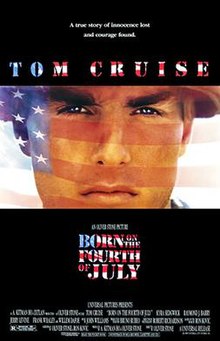
Tom Cruise was tapped for the physically and emotionally demanding starring role as Kovic is introduced to us as a child playing war with his buddies, his over-achieving high school years where anything but # 1 was just not an option, his enlistment in the marines and his two tours in Vietnam, from which he returned with injuries (physical and psychological) that, among other things, left him paralyzed and impotent. His strained rehabilitation process in a cramped and ill-equipped veterans hospital and his development into a war activist for all veterans, loudly protesting the treatment of veterans by the country that they felt betrayed them.

Stone's intentions as a director and co-screenwriter (he also co-wrote the screenplay with the real Kovic) are on the money, but Stone lets his emotions and perhaps his personal collaboration with the film's subject push this film into serious overdrive. I understand the idea of opening the film showing Kovic playing war as a child, but more than thirty minutes of running time is devoted to things like Kovic getting caught by his mom with a playboy magazine under his bed and not getting to go to prom with the girl of his dreams (Kyra Sedgewick, in a thankless role). A lot of this opening exposition really slows down the film.

The film doesn't really kick into high gear until Kovic arrives at the nasty veterans hospital which also houses rats the size of kittens roaming the floors. These scenes are not an easy watch, a very graphic depiction of the literal pieces that a lot of of our guys returned in and how normal functions like bathing and going to the bathroom are now impossible. These scenes are also wear Kovic's spirit kick back in, as we learn that Ron refused to accept his diagnosis of paralysis initially and was determined to walk out of that hospital. These scenes were, for this reviewer, the real ugliness of the Vietnam war.
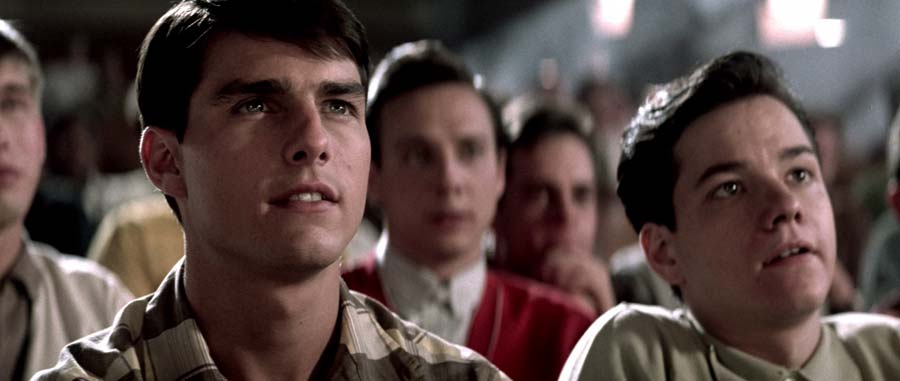
With Kovic himself as screenwriter, it's impossible to doubt the authenticity of what happened here and the film is a very manipulative experience that might force the viewer to take sides, or more importantly, change sides, but I think Stone's over-indulgent direction could have been reined in a bit.

Tom Cruise's sincere and emotionally charged interpretation of Ron Kovic earned him his very first Oscar nomination. There is also solid work from Raymond J. Barry and Caroline Kava as Ron's parents, Frank Whaley and Jerry Levine as two of Ron's high school buddies who went separate ways when Vietnam came about, and in his accustomed flashy performance, Willem Dafoe as another wheelchair bound vet that Kovic meets in Mexico. If you don't blink, you might also catch appearances from Tom Berenger, Stephen and Daniel Baldwin, Jason Gedrick and Cruise's real-life brother, William Mapother. The director also makes a cameo as a reporter. In addition to Stone's Oscar and Cruise's nomination, the film received five other nominations, winning for film editing. It's overlong and a little preachy, but the preachiness can be forgiven. Cruise definitely proved he was more than a pretty face here.
Oliver Stone won his second Best Director Oscar for piloting 1989 Best Picture nominee Born on the 4th of July, an overlong, manipulative, but effective biopic of Vietnam vet Ron Kovic, from his childhood to his wheeling onstage to be a keynote speaker at the 1976 Democratic National Convention.

Tom Cruise was tapped for the physically and emotionally demanding starring role as Kovic is introduced to us as a child playing war with his buddies, his over-achieving high school years where anything but # 1 was just not an option, his enlistment in the marines and his two tours in Vietnam, from which he returned with injuries (physical and psychological) that, among other things, left him paralyzed and impotent. His strained rehabilitation process in a cramped and ill-equipped veterans hospital and his development into a war activist for all veterans, loudly protesting the treatment of veterans by the country that they felt betrayed them.

Stone's intentions as a director and co-screenwriter (he also co-wrote the screenplay with the real Kovic) are on the money, but Stone lets his emotions and perhaps his personal collaboration with the film's subject push this film into serious overdrive. I understand the idea of opening the film showing Kovic playing war as a child, but more than thirty minutes of running time is devoted to things like Kovic getting caught by his mom with a playboy magazine under his bed and not getting to go to prom with the girl of his dreams (Kyra Sedgewick, in a thankless role). A lot of this opening exposition really slows down the film.

The film doesn't really kick into high gear until Kovic arrives at the nasty veterans hospital which also houses rats the size of kittens roaming the floors. These scenes are not an easy watch, a very graphic depiction of the literal pieces that a lot of of our guys returned in and how normal functions like bathing and going to the bathroom are now impossible. These scenes are also wear Kovic's spirit kick back in, as we learn that Ron refused to accept his diagnosis of paralysis initially and was determined to walk out of that hospital. These scenes were, for this reviewer, the real ugliness of the Vietnam war.

With Kovic himself as screenwriter, it's impossible to doubt the authenticity of what happened here and the film is a very manipulative experience that might force the viewer to take sides, or more importantly, change sides, but I think Stone's over-indulgent direction could have been reined in a bit.

Tom Cruise's sincere and emotionally charged interpretation of Ron Kovic earned him his very first Oscar nomination. There is also solid work from Raymond J. Barry and Caroline Kava as Ron's parents, Frank Whaley and Jerry Levine as two of Ron's high school buddies who went separate ways when Vietnam came about, and in his accustomed flashy performance, Willem Dafoe as another wheelchair bound vet that Kovic meets in Mexico. If you don't blink, you might also catch appearances from Tom Berenger, Stephen and Daniel Baldwin, Jason Gedrick and Cruise's real-life brother, William Mapother. The director also makes a cameo as a reporter. In addition to Stone's Oscar and Cruise's nomination, the film received five other nominations, winning for film editing. It's overlong and a little preachy, but the preachiness can be forgiven. Cruise definitely proved he was more than a pretty face here.
Last edited by Gideon58; 02-22-19 at 11:51 AM.
X
Favorite Movies
X
User Lists
A Thin Line Between Love and Hate
When he had the juice to bring what he wanted to the big screen, Martin Lawrence gave us 1996's A Thin Line Between Love Hate, a Lawrence vanity project that is basically Lawrence's lackluster rehashing of the 1987 classic Fatal Attraction.

Written and directed by the star as well, Lawrence plays Darnell Wright, a nightclub manager who thinks he is an irresistible babe magnet who runs from commitment and those three little words as long as he can. Darnell finds himself becoming serious about two very different women. Mia (Regina King) is a childhood friend who is all grown up now and just returned from a stint in the military. She's always had a thing for Darnell, but knows what kind of guy he is and has protected herself from being really hurt by him. Brandi (Lynn Whitfield) is a wealthy real estate agent who has a beach house in Malibu and is also an extremely dangerous psychopath.
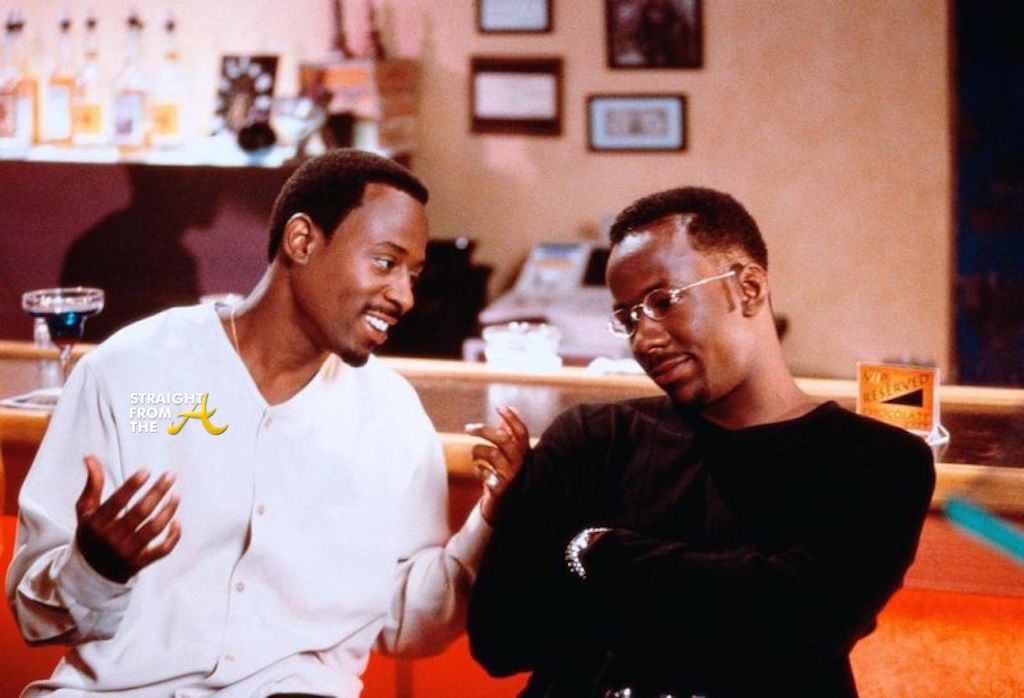
Though not big on originality, Lawrence has a pretty good idea here that he has tweaked just enough that anyone who has never seen Fatal Attraction might be fooled (even though he actually references the 1987 classic, which I guess in his mind made it an homage), but the real problem here is that screenwriter Lawrence has written a character for the actor Lawrence who is supposed to be the ultimate player and unless the viewer can accept Martin Lawrence as the sexiest man on the planet, the story doesn't really work because everything that happens in the film bounces off that concept.
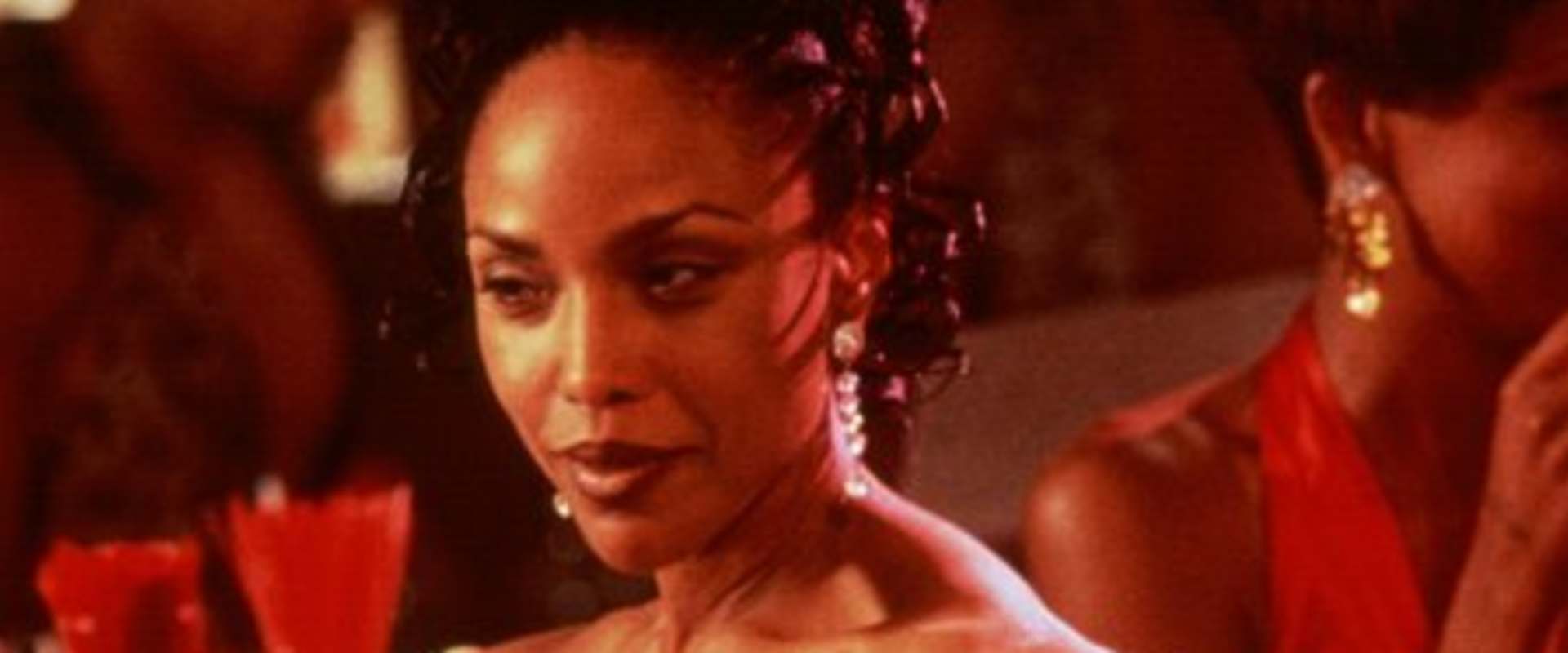
I also think Lawrence erred in his revealing the Brandi character...I think it happens a little too quickly. One scene we see her looking at herself in the mirror with shaking hands applying her makeup and minutes later, she is in bed with Darnell confessing that she murdered her ex-husband. Personally, I don't think a true psychopath would be so matter of fact in offering up information like that. We're also supposed to believe that she is this wealthy woman who has built her own real estate business...how has a woman who turns out to be as nuts as this one does not let any of her crazy slip into her business life? The transition from arrogant businesswoman to dangerous psycho just doesn't ring true.

Lawrence works very hard at making this comic madness palatable entertainment, but this one actually had me fighting toothpicks on the eyelids. Lynn Whitfield is a wonderful actress, but way too intelligent a screen presence for this kind of silliness. Bobby Brown revealed why his movie career never went anywhere after playing Darnell's BFF and business partner. Only Regina King rises above this mess and almost made it worth sitting through.
When he had the juice to bring what he wanted to the big screen, Martin Lawrence gave us 1996's A Thin Line Between Love Hate, a Lawrence vanity project that is basically Lawrence's lackluster rehashing of the 1987 classic Fatal Attraction.

Written and directed by the star as well, Lawrence plays Darnell Wright, a nightclub manager who thinks he is an irresistible babe magnet who runs from commitment and those three little words as long as he can. Darnell finds himself becoming serious about two very different women. Mia (Regina King) is a childhood friend who is all grown up now and just returned from a stint in the military. She's always had a thing for Darnell, but knows what kind of guy he is and has protected herself from being really hurt by him. Brandi (Lynn Whitfield) is a wealthy real estate agent who has a beach house in Malibu and is also an extremely dangerous psychopath.

Though not big on originality, Lawrence has a pretty good idea here that he has tweaked just enough that anyone who has never seen Fatal Attraction might be fooled (even though he actually references the 1987 classic, which I guess in his mind made it an homage), but the real problem here is that screenwriter Lawrence has written a character for the actor Lawrence who is supposed to be the ultimate player and unless the viewer can accept Martin Lawrence as the sexiest man on the planet, the story doesn't really work because everything that happens in the film bounces off that concept.

I also think Lawrence erred in his revealing the Brandi character...I think it happens a little too quickly. One scene we see her looking at herself in the mirror with shaking hands applying her makeup and minutes later, she is in bed with Darnell confessing that she murdered her ex-husband. Personally, I don't think a true psychopath would be so matter of fact in offering up information like that. We're also supposed to believe that she is this wealthy woman who has built her own real estate business...how has a woman who turns out to be as nuts as this one does not let any of her crazy slip into her business life? The transition from arrogant businesswoman to dangerous psycho just doesn't ring true.

Lawrence works very hard at making this comic madness palatable entertainment, but this one actually had me fighting toothpicks on the eyelids. Lynn Whitfield is a wonderful actress, but way too intelligent a screen presence for this kind of silliness. Bobby Brown revealed why his movie career never went anywhere after playing Darnell's BFF and business partner. Only Regina King rises above this mess and almost made it worth sitting through.
X
Favorite Movies
X
User Lists
Two for the Road
The professionalism in front of and behind the camera makes Two for the Road, an effervescent comedy drama from 1967, a picturesque and joyous travelogue through a troubled marriage that never fails to entertain.

Albert Finney and the enchanting Audrey Hepburn play Mark and Joanna, an architect and his wife, who are traveling through the south of France after the completion of Mark's latest job, frustrated with traveling and with the tension in their marriage. As they travel, the story flashes back to other road trips in the past, including their first, that provide clues as to why their marriage is not the fairy tale it used to be.
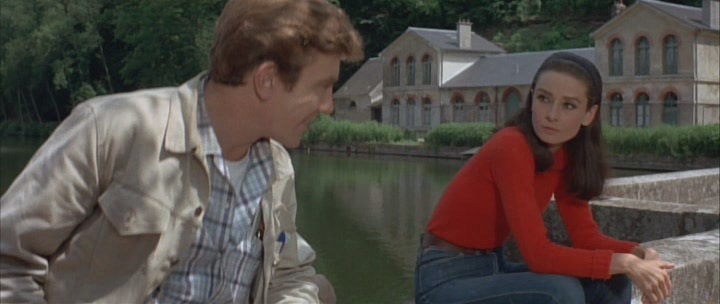
Frederick Raphael's Oscar-nominated screenplay is another one of those stories that is told out of chronological order before that became so fashionable a few decades later. When we meet Mark and Joanna, the tension between them can be cut with a knife and it is through Raphael's often stinging dialogue not only how Mark and Joanna feel about each other, but more importantly, how they both feel about the institution of marriage and their personal definitions of same. It's possible to track where the story goes via Mark and Joanna's hair and wardrobe.
.JPG)
Raphael's screenplay discreetly introduces obnoxious traveling companions, an addition of a child to their family, and infidelity as ingredients to the slow death of this marriage. This very special story is told against a gorgeous canvas, starting with the South of France and traveling all through Europe as their troublesome MG begins to become a metaphor for the decay of this marriage. Mark and Joanna rarely speak with any kind of filter and their rather complacent reaction to becoming parents was a standout example of this. In the opening scene, Mark can't even remember his daughter's name and we eventually learn why.

Director Stanley Donen has mounted an attractive postcard romance that provides a surprise or two along with the entertainment, providing a unique cinematic experience unlike any other. The performances Donen pulls from Albert Finney and Audrey Hepburn are nothing short of remarkable and how both actors were snubbed at Oscar time is beyond me, though Hepburn was nominated the same year for a different movie (Wait Until Dark). William Daniels also deserves mention as the perpetually anal Howard Manchester. And no talk of this movie can conclude without mentioning Henry Mancini's lilting and lovely musical score, which frames this adult fairy tale flawlessly. A discriminating film experience for the adult filmgoer.
The professionalism in front of and behind the camera makes Two for the Road, an effervescent comedy drama from 1967, a picturesque and joyous travelogue through a troubled marriage that never fails to entertain.

Albert Finney and the enchanting Audrey Hepburn play Mark and Joanna, an architect and his wife, who are traveling through the south of France after the completion of Mark's latest job, frustrated with traveling and with the tension in their marriage. As they travel, the story flashes back to other road trips in the past, including their first, that provide clues as to why their marriage is not the fairy tale it used to be.

Frederick Raphael's Oscar-nominated screenplay is another one of those stories that is told out of chronological order before that became so fashionable a few decades later. When we meet Mark and Joanna, the tension between them can be cut with a knife and it is through Raphael's often stinging dialogue not only how Mark and Joanna feel about each other, but more importantly, how they both feel about the institution of marriage and their personal definitions of same. It's possible to track where the story goes via Mark and Joanna's hair and wardrobe.
Raphael's screenplay discreetly introduces obnoxious traveling companions, an addition of a child to their family, and infidelity as ingredients to the slow death of this marriage. This very special story is told against a gorgeous canvas, starting with the South of France and traveling all through Europe as their troublesome MG begins to become a metaphor for the decay of this marriage. Mark and Joanna rarely speak with any kind of filter and their rather complacent reaction to becoming parents was a standout example of this. In the opening scene, Mark can't even remember his daughter's name and we eventually learn why.

Director Stanley Donen has mounted an attractive postcard romance that provides a surprise or two along with the entertainment, providing a unique cinematic experience unlike any other. The performances Donen pulls from Albert Finney and Audrey Hepburn are nothing short of remarkable and how both actors were snubbed at Oscar time is beyond me, though Hepburn was nominated the same year for a different movie (Wait Until Dark). William Daniels also deserves mention as the perpetually anal Howard Manchester. And no talk of this movie can conclude without mentioning Henry Mancini's lilting and lovely musical score, which frames this adult fairy tale flawlessly. A discriminating film experience for the adult filmgoer.
Last edited by Gideon58; 02-22-19 at 12:05 PM.
X
Favorite Movies
X
User Lists
Love Happens
A compelling story and some strong performances almost salvage 2009's Love Happens, yet another cinematic look at the grieving process that meanders a little too leisurely to a terrific finale.

The 2009 comedy drama stars Aaron Eckhart as Burke, a widower who lost his wife three years ago and wrote a book about what happened, which turns him into a celebrity self-help guru and a syndicated television star. He travels around the country conducting seminars on the grief process and as the movie opens, he has arrived in Seattle for a seminar and it's obvious that whatever he's supposed to be doing, his heart's not in it and we don't find out why until he meets an attractive florist (Jennifer Aniston) who forces him to be honest about the fact that he has never really completed his own grieving process.

Director and co-screenwriter Brandon Camp had a really good idea here, but the story takes way too long to get where it's going. This reviewer perceived that Burke was not what he appeared to be as he is shown standing backstage waiting to be introduced by his slimy agent (Dan Fogler)...something's not right with this guy and it's more than simple grief, but the screenplay by Camp and Mike Thompson throws off completely off track with what looks like a romance with Aniston's character, word games hidden behind paintings, watching rock concerts from utility trucks, and a shopping spree at Home Depot as part of the grief seminar. There is initial resentment of Burke who seems to be profiting from the death of his wife but said resentment is addressed when Burke is confronted by his father-in-law (Martin Sheen) about how he has been processing his grief.
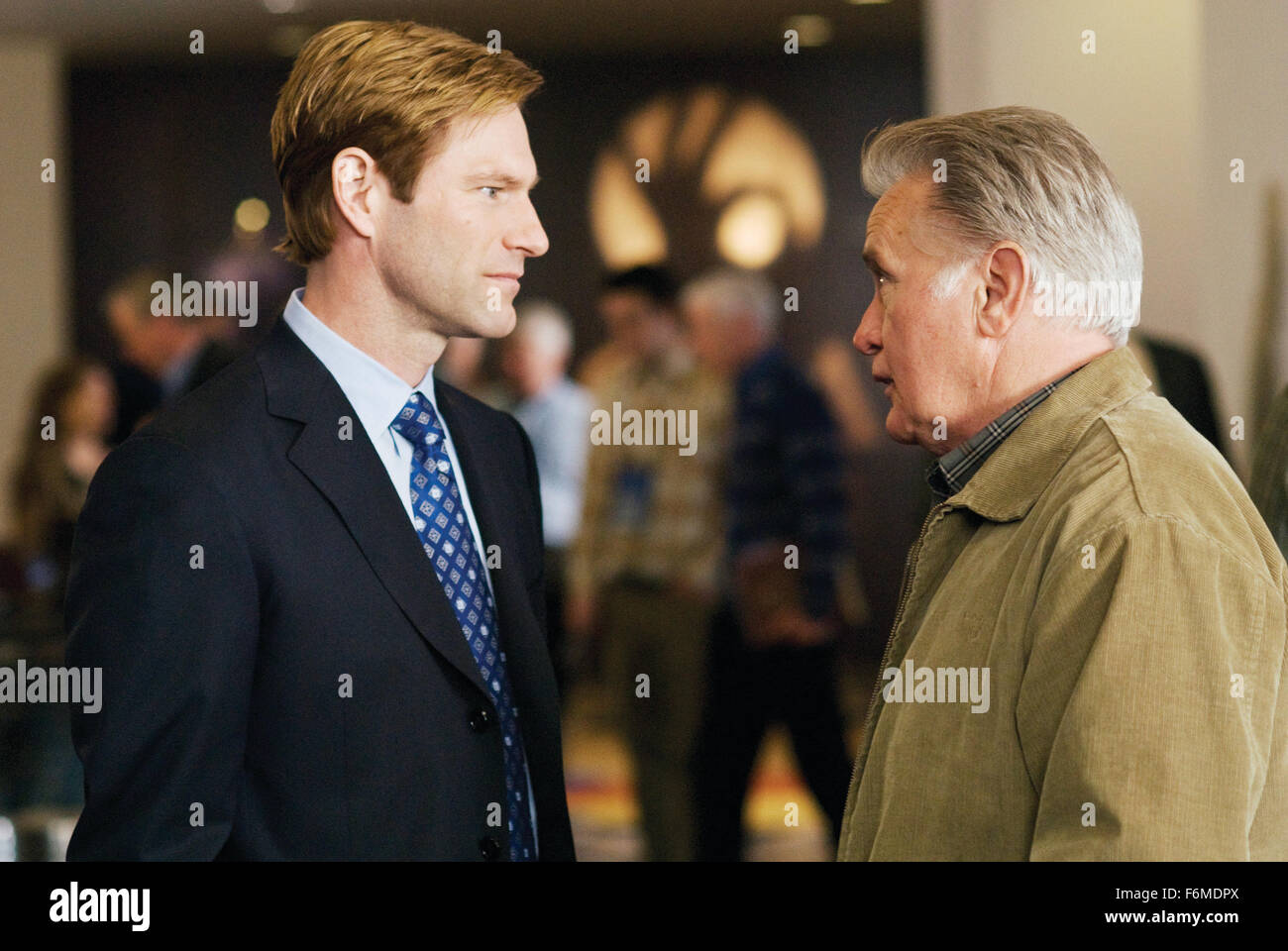
We have to wait well into the final act to find out exactly what's going on with Burke, but it's a pretty labored journey getting there, though the scenes of Burke trying to fulfill his wife's request for her parrot, Rocky, to be released to the wild a lot of fun, most of what else went on between the opening act and the final one was almost snore-inducing. It even gets a little manipulative near the end as well, actually utilizing the slow-motion clap that was featured in every teenage rom-com made during the 1980's.

Eckhart again proves he's one of the industry's most underrated actors with a performance that is simultaneously slick and moving and he works well with Aniston, who makes the most of a thankless role. Martin Sheen was excellent as Burke's father-in-law and there is some beautifully modulated work from John Carroll Lynch, who you might remember as Frances McDormand's husband in Fargo, as a grieving father about to drop out of the seminar who Burke is able to connect with. There's about one third of a really great movie here and I don't get the title at all.
A compelling story and some strong performances almost salvage 2009's Love Happens, yet another cinematic look at the grieving process that meanders a little too leisurely to a terrific finale.

The 2009 comedy drama stars Aaron Eckhart as Burke, a widower who lost his wife three years ago and wrote a book about what happened, which turns him into a celebrity self-help guru and a syndicated television star. He travels around the country conducting seminars on the grief process and as the movie opens, he has arrived in Seattle for a seminar and it's obvious that whatever he's supposed to be doing, his heart's not in it and we don't find out why until he meets an attractive florist (Jennifer Aniston) who forces him to be honest about the fact that he has never really completed his own grieving process.

Director and co-screenwriter Brandon Camp had a really good idea here, but the story takes way too long to get where it's going. This reviewer perceived that Burke was not what he appeared to be as he is shown standing backstage waiting to be introduced by his slimy agent (Dan Fogler)...something's not right with this guy and it's more than simple grief, but the screenplay by Camp and Mike Thompson throws off completely off track with what looks like a romance with Aniston's character, word games hidden behind paintings, watching rock concerts from utility trucks, and a shopping spree at Home Depot as part of the grief seminar. There is initial resentment of Burke who seems to be profiting from the death of his wife but said resentment is addressed when Burke is confronted by his father-in-law (Martin Sheen) about how he has been processing his grief.

We have to wait well into the final act to find out exactly what's going on with Burke, but it's a pretty labored journey getting there, though the scenes of Burke trying to fulfill his wife's request for her parrot, Rocky, to be released to the wild a lot of fun, most of what else went on between the opening act and the final one was almost snore-inducing. It even gets a little manipulative near the end as well, actually utilizing the slow-motion clap that was featured in every teenage rom-com made during the 1980's.

Eckhart again proves he's one of the industry's most underrated actors with a performance that is simultaneously slick and moving and he works well with Aniston, who makes the most of a thankless role. Martin Sheen was excellent as Burke's father-in-law and there is some beautifully modulated work from John Carroll Lynch, who you might remember as Frances McDormand's husband in Fargo, as a grieving father about to drop out of the seminar who Burke is able to connect with. There's about one third of a really great movie here and I don't get the title at all.
X
Favorite Movies
X
User Lists
Holiday (1938)
Before The Philadelphia Story, Phillip Barry, Donald Ogden Stewart and director George Cukor collaborated on the 1938 comedy Holiday, the third onscreen teaming of Cary Grant and Katharine Hepburn that charms with its sophisticated dialogue and effervescent performances from the stars.
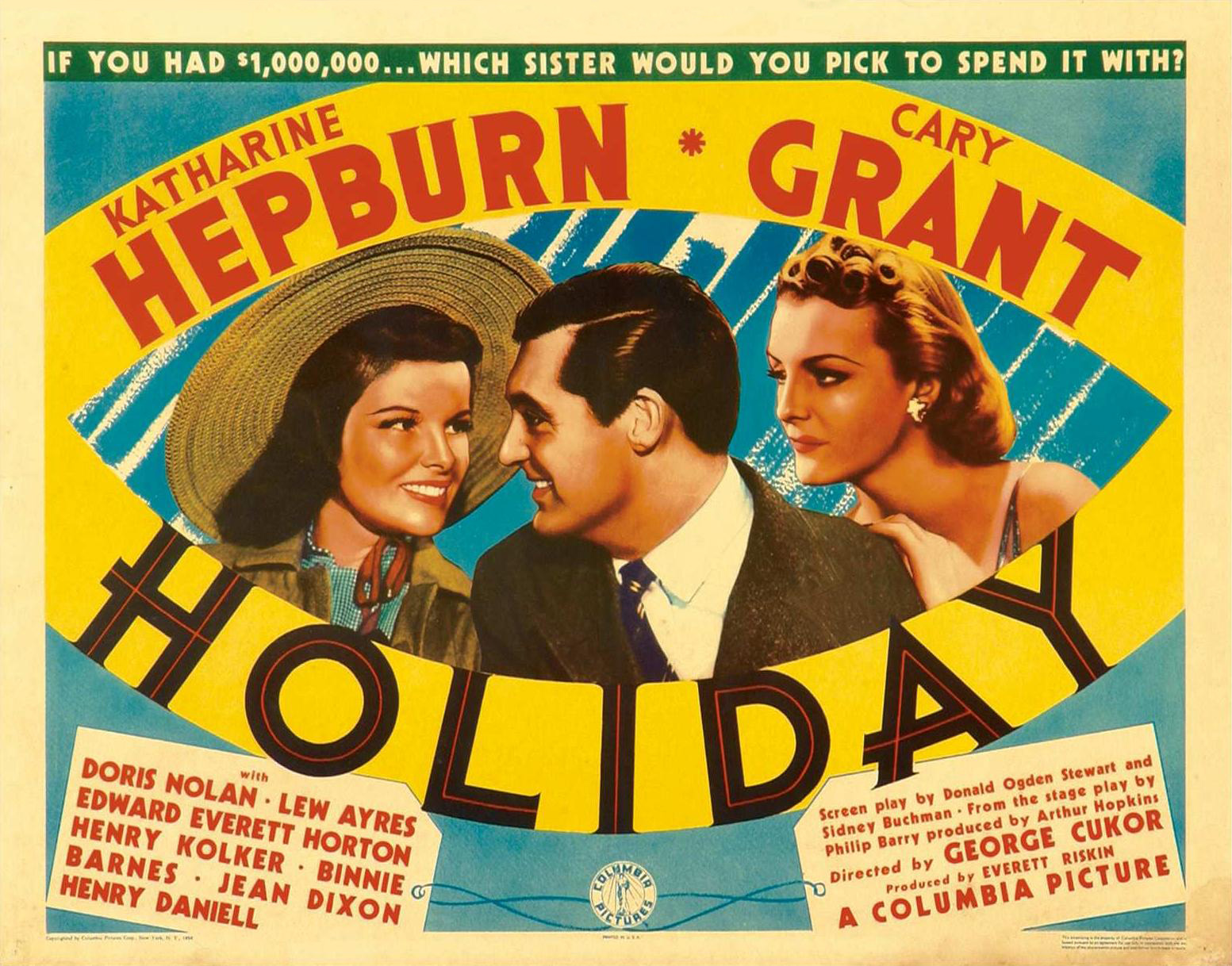
Grant plays Johnny Case, an eccentric playboy who has found himself engaged to an icy socialite named Julia Seton (Doris Nolan), unaware that she's from an extremely wealthy family. Julia and her father (Henry Kolker) are initially charmed by Johnny until he shares his outrageous life plan where he plans to take his retirement, or "holiday" as he calls it, now while he's young instead of working for 20 or 30 years. Julia is horrified but her sister, Linda (Hepburn) is fascinated by Johnny and his life plan, as is Julia and Linda's baby brother, Ned (Lew Ayres).
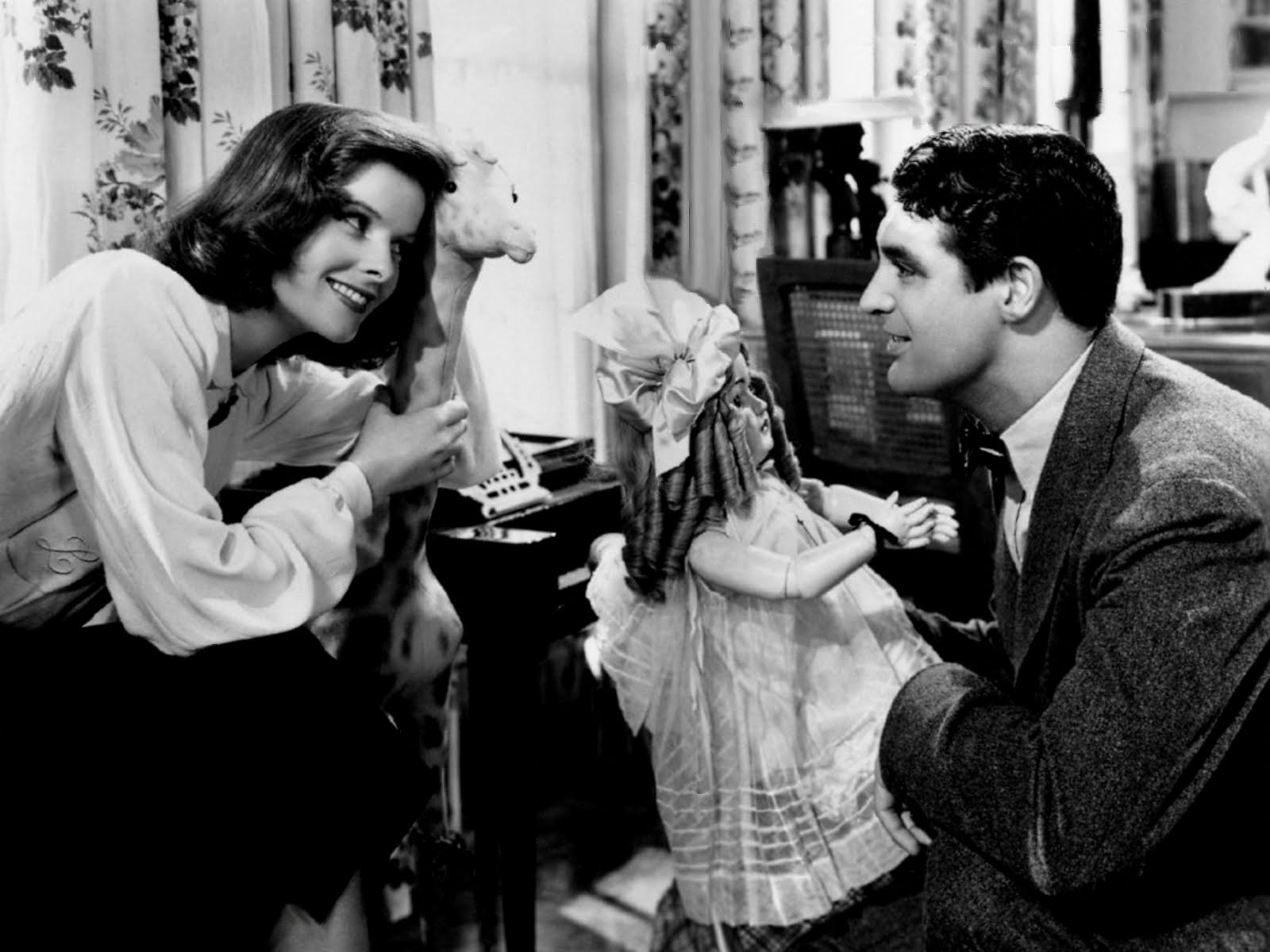
The story is based on a play by Phillip Barry that premiered on Broadway in 1928 and ran for over 225 performances. As he would later with The Philadelphia Story, Donald Ogden Stewart, along with Sidney Buchman, adapted this witty adult comedy for the screen, which has a real Noel Coward sensibility to the proceedings...a bunch of people chasing after the wrong people and unaware that they're chasing after the wrong people while the right people are standing right under their noses, or sacrificing their own happiness for other people because it's the right thing to do.

When we met Grant and Hepburn at the opening of The Philadelphia Story, they were divorced, but their characters are strangers when they meet here and Grant's character is engaged to Hepburn's sister, so we strap ourselves in for what could be a long and complex journey to what we've been promised. It is a pretty complex journey but surprisingly economic and Cukor and company make us wait until the final frame for what we know is coming.

Cukor gets the expected splendid performances from Grant and Hepburn but works wonders on his supporting cast as well. Lew Ayres is very amusing as the drunken Seton heir (Ayres' resemblance to a young Jack Lemmon in this movie is spooky), as are Edward Everett Horton and Jean Dixon as Johnny's married buddies whose last name keeps getting mispronounced and Doris Nolan brings an effective level of bitchiness to the snooty Julia, but they and Cukor never forget who the stars are and the work of Katharine Hepburn and Cary Grant alone makes this ticket worth the price of admission.
Before The Philadelphia Story, Phillip Barry, Donald Ogden Stewart and director George Cukor collaborated on the 1938 comedy Holiday, the third onscreen teaming of Cary Grant and Katharine Hepburn that charms with its sophisticated dialogue and effervescent performances from the stars.

Grant plays Johnny Case, an eccentric playboy who has found himself engaged to an icy socialite named Julia Seton (Doris Nolan), unaware that she's from an extremely wealthy family. Julia and her father (Henry Kolker) are initially charmed by Johnny until he shares his outrageous life plan where he plans to take his retirement, or "holiday" as he calls it, now while he's young instead of working for 20 or 30 years. Julia is horrified but her sister, Linda (Hepburn) is fascinated by Johnny and his life plan, as is Julia and Linda's baby brother, Ned (Lew Ayres).

The story is based on a play by Phillip Barry that premiered on Broadway in 1928 and ran for over 225 performances. As he would later with The Philadelphia Story, Donald Ogden Stewart, along with Sidney Buchman, adapted this witty adult comedy for the screen, which has a real Noel Coward sensibility to the proceedings...a bunch of people chasing after the wrong people and unaware that they're chasing after the wrong people while the right people are standing right under their noses, or sacrificing their own happiness for other people because it's the right thing to do.

When we met Grant and Hepburn at the opening of The Philadelphia Story, they were divorced, but their characters are strangers when they meet here and Grant's character is engaged to Hepburn's sister, so we strap ourselves in for what could be a long and complex journey to what we've been promised. It is a pretty complex journey but surprisingly economic and Cukor and company make us wait until the final frame for what we know is coming.

Cukor gets the expected splendid performances from Grant and Hepburn but works wonders on his supporting cast as well. Lew Ayres is very amusing as the drunken Seton heir (Ayres' resemblance to a young Jack Lemmon in this movie is spooky), as are Edward Everett Horton and Jean Dixon as Johnny's married buddies whose last name keeps getting mispronounced and Doris Nolan brings an effective level of bitchiness to the snooty Julia, but they and Cukor never forget who the stars are and the work of Katharine Hepburn and Cary Grant alone makes this ticket worth the price of admission.
X
Favorite Movies
X
User Lists
Stir Crazy
After their first successful teaming in Silver Streak, Gene Wilder and Richard Pryor were reunited for the elaborate comic adventure Stir Crazy, an overlong comedy romp that doesn't quite live up to its reputation, primarily due to an overstuffed screenplay, but the stars still make it a worthwhile trip and a sad reminder how much they are missed.

Wilder and Pryor play Skip Donahue and Harry Monroe, respectively. They are BFF's who have been both fired from their jobs and leave town for a fresh start and end up getting arrested for a crime they didn't commit and end up being sent to a prison work farm where their struggle to survive prison life is interrupted by a prison rodeo run by a pair of crooked wardens who are pocketing all of the profits.

Screenwriter Bruce Jay Friedman's screenplay takes the situations presented in prison work farm movies like Cool Hand Luke and The Longest Yard and turns them on their ear, providing a welcome canvas for the laughs provided by the stars, a lot of which I'm pretty sure are improvised. The canvas provides a perfect framework for Wilder and Pryor to demonstrate the one-of-a-kind chemistry that they shared onscreen and made the minor problems with the film forgivable. We get most of the scenes we expect like the boys being hassled by the warden and his flying monkey, their taming of the prison monster, and the gay inmate who has a crush on one of them, but it's all played strictly for laughs here, though some of the laughs are a little dated in 2019.

The strongest part of the film is its center, when the guys first arrive at the prison farm and are trying to figure out how to survive. Two guys trying to survive prison life is a palatable enough plot for this movie and director Sidney Poitier makes sure that the laughs provided stay center stage during this part of the movie, but it does lose steam when the guys stop worrying about themselves and start worrying about the crooked wardens and trying to stop what they're doing.

Poitier doesn't tamper too much with the comic gold that is Wilder and Pryor and they do bring the funny. The supporting cast is peppered with several familiar faces including Barry Corbin (doing his patented redneck warden), Georg Stanford Brown, Jonathan Banks, Nicholas Coster, Joel Brooks, Franklyn Ajaye, and, though they share no scenes together, Craig T. Nelson and Jobeth Williams, whose next acting assignments would be playing the parents in Poltergeist. It takes a minute to get going and it loses steam towards the end, but the middle is more than wroth the ride, though it doesn't quite live up to its reputation.
After their first successful teaming in Silver Streak, Gene Wilder and Richard Pryor were reunited for the elaborate comic adventure Stir Crazy, an overlong comedy romp that doesn't quite live up to its reputation, primarily due to an overstuffed screenplay, but the stars still make it a worthwhile trip and a sad reminder how much they are missed.

Wilder and Pryor play Skip Donahue and Harry Monroe, respectively. They are BFF's who have been both fired from their jobs and leave town for a fresh start and end up getting arrested for a crime they didn't commit and end up being sent to a prison work farm where their struggle to survive prison life is interrupted by a prison rodeo run by a pair of crooked wardens who are pocketing all of the profits.

Screenwriter Bruce Jay Friedman's screenplay takes the situations presented in prison work farm movies like Cool Hand Luke and The Longest Yard and turns them on their ear, providing a welcome canvas for the laughs provided by the stars, a lot of which I'm pretty sure are improvised. The canvas provides a perfect framework for Wilder and Pryor to demonstrate the one-of-a-kind chemistry that they shared onscreen and made the minor problems with the film forgivable. We get most of the scenes we expect like the boys being hassled by the warden and his flying monkey, their taming of the prison monster, and the gay inmate who has a crush on one of them, but it's all played strictly for laughs here, though some of the laughs are a little dated in 2019.

The strongest part of the film is its center, when the guys first arrive at the prison farm and are trying to figure out how to survive. Two guys trying to survive prison life is a palatable enough plot for this movie and director Sidney Poitier makes sure that the laughs provided stay center stage during this part of the movie, but it does lose steam when the guys stop worrying about themselves and start worrying about the crooked wardens and trying to stop what they're doing.

Poitier doesn't tamper too much with the comic gold that is Wilder and Pryor and they do bring the funny. The supporting cast is peppered with several familiar faces including Barry Corbin (doing his patented redneck warden), Georg Stanford Brown, Jonathan Banks, Nicholas Coster, Joel Brooks, Franklyn Ajaye, and, though they share no scenes together, Craig T. Nelson and Jobeth Williams, whose next acting assignments would be playing the parents in Poltergeist. It takes a minute to get going and it loses steam towards the end, but the middle is more than wroth the ride, though it doesn't quite live up to its reputation.
Last edited by Gideon58; 02-15-19 at 10:46 AM.
X
Favorite Movies
X
User Lists
Eighth Grade
For those who don't remember how much it sucked being 14 years old, you might want to check out a quietly brilliant little sleeper called Eighth Grade that nails the 24-hour teenage growing pains that are occurring at that very tender and very pivotal age.

This 2018 film chronicles the final weeks of eighth grade for a 14 year old girl named Kayla Day. Kayla is slightly overweight, has a face full of pimples, and when she's not hiding from the world in her phone, she is doing a podcast on You Tube where she gives advice on how to be popular. Unfortunately, it is apparent with each video that Kayla makes that the girl never follows her own advice. On one hand, Kayla feels pretty much invisible at school where she struggles for popularity and can't get class stud Aidan to look at her twice, but can't get away from the overprotective eye of her loving single dad. Kayla finds an unexpected turning point in her life when a school shadowing project provides a connection for Kayla with a high school girl named Olivia.

Director and screenwriter Bo Burnham scores a direct bullseye here that doesn't just accurately survey contemporary teenage growing pains, but also subtly discerns the differences between said growing pains now and say twenty years ago, when school and life in general were vastly different experiences. I have to admit to being taken aback when a couple of different scenes in the film were devoted to students being trained what they should do if they ever hear shooting on the school grounds. This was something that just wasn't part of my school experience, but I understand why it is essential now.

On the other hand, there were situations presented in Kayla's life that rang completely true. Her attempts to befriend the bitchy and popular Kennedy were so sad and even sadder was when Kennedy's mother insisted that Kayla come to a party that Kennedy was having and had no intention of inviting Kayla. Kayla's dread upon arrival at the party and later calling her father and begging him to get her was just a little too real. And let's talk about dad...can't recall the last time I saw a father trying so hard to be part of his daughter's life and failing so abysmally. I love when he drops her off at the mall to meet Olivia and he stays there to spy on her. Mark Day just might be the hardest working single dad in cinema history, right up there with Eugene Levy in American Pie.

There was some serious Oscar buzz for newcomer Elsie Fisher, who is an absolute revelation in the starring role. With the aid of director Burnhan, she effortlessly conveys the character's pain and joy...watch the joy in her eyes and her gait when she is on the phone with Olivia, it's heartwarming to watch and Josh Hamilton is terrific as her trying-not-to-smother-her dad, who is there when she needs him. Burnham displays an imaginative eye with the camera and a bouquet to Anna Meredith's off-the-wall music as well. The first movie in a long time that made me glad I'm not a teenager anymore.
For those who don't remember how much it sucked being 14 years old, you might want to check out a quietly brilliant little sleeper called Eighth Grade that nails the 24-hour teenage growing pains that are occurring at that very tender and very pivotal age.

This 2018 film chronicles the final weeks of eighth grade for a 14 year old girl named Kayla Day. Kayla is slightly overweight, has a face full of pimples, and when she's not hiding from the world in her phone, she is doing a podcast on You Tube where she gives advice on how to be popular. Unfortunately, it is apparent with each video that Kayla makes that the girl never follows her own advice. On one hand, Kayla feels pretty much invisible at school where she struggles for popularity and can't get class stud Aidan to look at her twice, but can't get away from the overprotective eye of her loving single dad. Kayla finds an unexpected turning point in her life when a school shadowing project provides a connection for Kayla with a high school girl named Olivia.
Director and screenwriter Bo Burnham scores a direct bullseye here that doesn't just accurately survey contemporary teenage growing pains, but also subtly discerns the differences between said growing pains now and say twenty years ago, when school and life in general were vastly different experiences. I have to admit to being taken aback when a couple of different scenes in the film were devoted to students being trained what they should do if they ever hear shooting on the school grounds. This was something that just wasn't part of my school experience, but I understand why it is essential now.

On the other hand, there were situations presented in Kayla's life that rang completely true. Her attempts to befriend the bitchy and popular Kennedy were so sad and even sadder was when Kennedy's mother insisted that Kayla come to a party that Kennedy was having and had no intention of inviting Kayla. Kayla's dread upon arrival at the party and later calling her father and begging him to get her was just a little too real. And let's talk about dad...can't recall the last time I saw a father trying so hard to be part of his daughter's life and failing so abysmally. I love when he drops her off at the mall to meet Olivia and he stays there to spy on her. Mark Day just might be the hardest working single dad in cinema history, right up there with Eugene Levy in American Pie.

There was some serious Oscar buzz for newcomer Elsie Fisher, who is an absolute revelation in the starring role. With the aid of director Burnhan, she effortlessly conveys the character's pain and joy...watch the joy in her eyes and her gait when she is on the phone with Olivia, it's heartwarming to watch and Josh Hamilton is terrific as her trying-not-to-smother-her dad, who is there when she needs him. Burnham displays an imaginative eye with the camera and a bouquet to Anna Meredith's off-the-wall music as well. The first movie in a long time that made me glad I'm not a teenager anymore.
X
Favorite Movies
X
User Lists
Jane Fonda in Five Acts
The one of a kind life and career of the legendary Jane Fonda is documented in Jane Fonda in Five Acts, a slightly pretentious and definitely overlong documentary that spends more time focusing on her activism than her acting career and in what seems to be pandering to the star herself, seems to go on forever.

Director Susan Lacy obviously had the star at her ear for every minute of this process of producing this HBO documentary because there is not a moment onscreen here that didn't seem to be pre-approved by the star before making it to the final cut because the actress comes out looking like Superwoman here and I don't think that's an accident. Ironically, the first four acts of the five acts in the life of this alleged super woman were named after her father and her three husbands. We're talking about a woman who has been the ultimate symbol of female empowerment for decades and the director titles sections of her life after the men in her life?
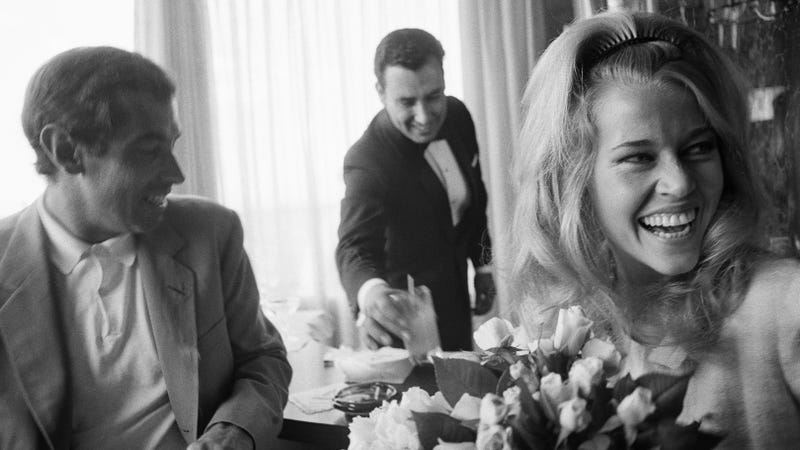
The film does a nice job of profiling the extremely complicated relationship she had with both of her parents. I have to admit I found this part of the documentary very interesting because I have never heard or read anything about Fonda's mother before. I had always seen Henry Fonda photographed with his last wife Shirlee, but had no exposure to his previous marriages. Jane lets us know that she felt emotionally abused and unloved by both of her parents. It's revealed that her mother was what is now known as bipolar and eventually took her own life. It's also revealed that Henry was not exactly the husband or father of the year either...there's a heartbreaking moment in the film where Fonda is looking at a photograph of her entire family and recalls that her father was cheating on her mother at the time and that the family was terribly unhappy when the photograph was taken...one of the documentary's truly moving moments. It's made clear here that everything we saw onscreen between Jane and Henry in On Golden Pond was quite real...she even talks about an unscripted moment she initiated that brought tears to both sets of eyes.

Sadly, the majority of this documentary is the star droning on and on about how unhappy she was and how no one, including her father and three husbands, ever really understood her. The documentary does focus a little too strongly on her "Hanoi Jane" period and how she regrets a lot of what she was doing then, though she doesn't regret the activist spirit that was imbued inside her by her time as Hanoi Jane, but personally, this is water on the bridge or water that no one cares about anymore, and I would have liked this documentary to have concentrated a little more on her than her incredible film career than her career as an activist. It was interesting to learn that it was her activism that was the impetus for her famous workout tape.

We did get a few tidbits about her movie career along the way...we learned that she was very drunk when she filmed the nude opening to Barbarella and that she begged Alan J. Pakula to hire someone else for Klute because she just didn't feel she was right for the part.

It was also a little unsettling watching her talk about her marriages to Roger Vadim, Tom Hayden, and Ted Turner. It was odd that such an independent spirit would marry three such controlling men, though she does refer to Ted Turner as her "favorite ex-husband."

Commentary is provided along the way by Tom Hayden, Ted Turner, producer Paula Weinstein, Robert Redford, Troy Garity (her son with Hayden), her stepdaughter Nathalie Vadim, and her black adopted daughter Lulu Williams. I thought it was telling that Troy, Nathalie, and Lulu all agreed to appear in this documentary, but Vanessa, her daughter with Roger Vadim, did not. Not that anyone other than Fonda got a lot of screentime anyway, and this screentime went on forever, I didn't think this movie would ever end, but Fonda is a Hollywood legend worthy of the attention, but it just seemed a little over-indulgent to me.
The one of a kind life and career of the legendary Jane Fonda is documented in Jane Fonda in Five Acts, a slightly pretentious and definitely overlong documentary that spends more time focusing on her activism than her acting career and in what seems to be pandering to the star herself, seems to go on forever.

Director Susan Lacy obviously had the star at her ear for every minute of this process of producing this HBO documentary because there is not a moment onscreen here that didn't seem to be pre-approved by the star before making it to the final cut because the actress comes out looking like Superwoman here and I don't think that's an accident. Ironically, the first four acts of the five acts in the life of this alleged super woman were named after her father and her three husbands. We're talking about a woman who has been the ultimate symbol of female empowerment for decades and the director titles sections of her life after the men in her life?

The film does a nice job of profiling the extremely complicated relationship she had with both of her parents. I have to admit I found this part of the documentary very interesting because I have never heard or read anything about Fonda's mother before. I had always seen Henry Fonda photographed with his last wife Shirlee, but had no exposure to his previous marriages. Jane lets us know that she felt emotionally abused and unloved by both of her parents. It's revealed that her mother was what is now known as bipolar and eventually took her own life. It's also revealed that Henry was not exactly the husband or father of the year either...there's a heartbreaking moment in the film where Fonda is looking at a photograph of her entire family and recalls that her father was cheating on her mother at the time and that the family was terribly unhappy when the photograph was taken...one of the documentary's truly moving moments. It's made clear here that everything we saw onscreen between Jane and Henry in On Golden Pond was quite real...she even talks about an unscripted moment she initiated that brought tears to both sets of eyes.

Sadly, the majority of this documentary is the star droning on and on about how unhappy she was and how no one, including her father and three husbands, ever really understood her. The documentary does focus a little too strongly on her "Hanoi Jane" period and how she regrets a lot of what she was doing then, though she doesn't regret the activist spirit that was imbued inside her by her time as Hanoi Jane, but personally, this is water on the bridge or water that no one cares about anymore, and I would have liked this documentary to have concentrated a little more on her than her incredible film career than her career as an activist. It was interesting to learn that it was her activism that was the impetus for her famous workout tape.

We did get a few tidbits about her movie career along the way...we learned that she was very drunk when she filmed the nude opening to Barbarella and that she begged Alan J. Pakula to hire someone else for Klute because she just didn't feel she was right for the part.

It was also a little unsettling watching her talk about her marriages to Roger Vadim, Tom Hayden, and Ted Turner. It was odd that such an independent spirit would marry three such controlling men, though she does refer to Ted Turner as her "favorite ex-husband."

Commentary is provided along the way by Tom Hayden, Ted Turner, producer Paula Weinstein, Robert Redford, Troy Garity (her son with Hayden), her stepdaughter Nathalie Vadim, and her black adopted daughter Lulu Williams. I thought it was telling that Troy, Nathalie, and Lulu all agreed to appear in this documentary, but Vanessa, her daughter with Roger Vadim, did not. Not that anyone other than Fonda got a lot of screentime anyway, and this screentime went on forever, I didn't think this movie would ever end, but Fonda is a Hollywood legend worthy of the attention, but it just seemed a little over-indulgent to me.
Last edited by Gideon58; 02-15-19 at 07:17 PM.
X
Favorite Movies
X
User Lists
Dead Poets Society
A 1989 Best Picture Nominee, Dead Poets Society is a handsomely mounted tale of passion and hope and not the passion that the idea of romance conjures, but the kind of passion behind the expression "Carpe Diem."
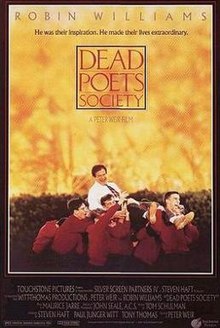
The late Robin Williams received an Oscar nomination for his performance as John Keaton, a new English teacher at a fancy boys' prep school who has a profound effect on his students through the formation of a very special club and his drive to have his students discover and pursue their individual passion, a drive that has unforeseen consequences on three of his students in particular.

Tom Schulman's Oscar-winning screenplay is rich with tense situations that are driven by almost lyrical dialogue that allows this story to sparkle, despite an unexpected detour to a very dark place which somehow manages to bounce back for a finale that had this reviewer simultaneously wanting to cheer and fight tears.

Director Peter Weir, whose resume would eventually be a textbook on the frailty of the human condition with films like Witness, The Truman Show, and Fearless, lends a joyous yet sensitive directorial eye to this often compelling story that offers riches that the viewer sometimes has to dig for, but this is not the first time Weir's work has run roughshod with my emotions.

Williams delivers one of his most controlled performances that, curiously, commands the screen without overshadowing some strong work from a young Ethan Hawke, Josh Charles, and especially Robert Sean Leonard as Keating's very special students. Mention should also be made of Kurtwood Smith as Leonard's hard-nosed father. The film features first rate production values with John Seale's cinematography and Maurice Jarre's music being standout elements. A very special cinematic journey.
A 1989 Best Picture Nominee, Dead Poets Society is a handsomely mounted tale of passion and hope and not the passion that the idea of romance conjures, but the kind of passion behind the expression "Carpe Diem."

The late Robin Williams received an Oscar nomination for his performance as John Keaton, a new English teacher at a fancy boys' prep school who has a profound effect on his students through the formation of a very special club and his drive to have his students discover and pursue their individual passion, a drive that has unforeseen consequences on three of his students in particular.

Tom Schulman's Oscar-winning screenplay is rich with tense situations that are driven by almost lyrical dialogue that allows this story to sparkle, despite an unexpected detour to a very dark place which somehow manages to bounce back for a finale that had this reviewer simultaneously wanting to cheer and fight tears.

Director Peter Weir, whose resume would eventually be a textbook on the frailty of the human condition with films like Witness, The Truman Show, and Fearless, lends a joyous yet sensitive directorial eye to this often compelling story that offers riches that the viewer sometimes has to dig for, but this is not the first time Weir's work has run roughshod with my emotions.

Williams delivers one of his most controlled performances that, curiously, commands the screen without overshadowing some strong work from a young Ethan Hawke, Josh Charles, and especially Robert Sean Leonard as Keating's very special students. Mention should also be made of Kurtwood Smith as Leonard's hard-nosed father. The film features first rate production values with John Seale's cinematography and Maurice Jarre's music being standout elements. A very special cinematic journey.
X
Favorite Movies
X
User Lists
Women in Love
The provocative direction of Ken Russell and some superb performances anchor 1969's Women in Love, Russell's dark and steamy adaptation of DH Lawrence's novel that is a haunting tale of lust, betrayal, and the always blurry lines of sexual orientation that provides arresting visuals and sophisticated erotica, but never really gels as a complete cinematic experience.

The setting for this very different battle of the sexes is Britain's Industrial Midlands during the 1920's. Gerald Critch (Oliver Reed) and Rupert Berkin (Alan Bates) are best friends who become romantically involved with a pair of sisters: Gundrun (Glenda Jackson) is an artist and Ursula (Jennie Linden) is a schoolteacher. After a long fought relationship with numerous peaks and valleys, Rupert marries Ursula and Gerald commits to Gundrun, despite the fact that Gerald and Rupert continue to fight and deny the feelings they have for each other.
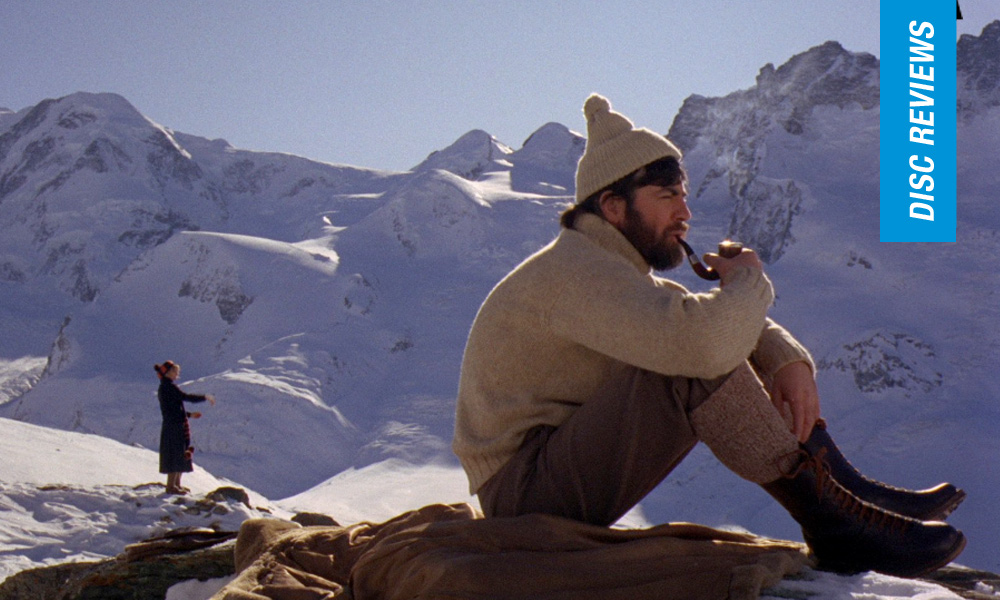
Russell was probably the only director who had the juice and the guts to bring Lawrence's most famous work to the screen, with a grand assist from Larry Kramer, whose screenplay of the novel earned him an Oscar nomination, despite its occasional ambiguity about what's going on here. We think we are being brought into a simple tale of two best friends in love with two sisters, but our first clue is a lot of sophisticated dialogue about the validity of the concept of love. All four principal characters question the traditional concepts of love and marriage and despite the almost animal attraction between the two couples, eyebrows are raised when, seemingly out of nowhere, Gerald and Rupert have a nude wrestling match in front of a roaring fire.

The wrestling match is just one of several seriously erotic scenes in this film that spit in the face of traditional love and sexuality. Russell forces complete commitment out of his actors to make this work, which includes full frontal Reed and Bates, and Jackson revealing her breasts during two different scenes (Jackson was pregnant at the time so her breasts were rather "substantial"). There's a psychological element to the erotica that is, at times, a little unsettling. There's one scene where Reed and Jackson are having sex and images of Reed's slightly insane mother keep running through his head. There's a whole lot going on here and Russell and Kramer seem to have something very important to say here. Unfortunately, they wait until the final scene to say it, making a lot of what comes before a little bit confusing.

Russell gets exceptional performances from his stars. Glenda Jackson won the Outstanding Leading Actress Oscar of 1970, even though the film was released in '69. Her polished performance committing to a somewhat unlikable character is a joy to behold....love that scene of her chasing off the cattle through interpretative dance. Reed is dark and chilling,as always, but truthfully, Alan Bates gives my favorite performance in the film as the tempestuous Rupert, the only character in this movie who says exactly what he feels. Bates' performance here is electric sex, unlike anything I have ever seen. I wish the story had committed the way the actors did. This would have been one of the best films of the 1960's, but the parts are still better than the whole.
The provocative direction of Ken Russell and some superb performances anchor 1969's Women in Love, Russell's dark and steamy adaptation of DH Lawrence's novel that is a haunting tale of lust, betrayal, and the always blurry lines of sexual orientation that provides arresting visuals and sophisticated erotica, but never really gels as a complete cinematic experience.

The setting for this very different battle of the sexes is Britain's Industrial Midlands during the 1920's. Gerald Critch (Oliver Reed) and Rupert Berkin (Alan Bates) are best friends who become romantically involved with a pair of sisters: Gundrun (Glenda Jackson) is an artist and Ursula (Jennie Linden) is a schoolteacher. After a long fought relationship with numerous peaks and valleys, Rupert marries Ursula and Gerald commits to Gundrun, despite the fact that Gerald and Rupert continue to fight and deny the feelings they have for each other.

Russell was probably the only director who had the juice and the guts to bring Lawrence's most famous work to the screen, with a grand assist from Larry Kramer, whose screenplay of the novel earned him an Oscar nomination, despite its occasional ambiguity about what's going on here. We think we are being brought into a simple tale of two best friends in love with two sisters, but our first clue is a lot of sophisticated dialogue about the validity of the concept of love. All four principal characters question the traditional concepts of love and marriage and despite the almost animal attraction between the two couples, eyebrows are raised when, seemingly out of nowhere, Gerald and Rupert have a nude wrestling match in front of a roaring fire.

The wrestling match is just one of several seriously erotic scenes in this film that spit in the face of traditional love and sexuality. Russell forces complete commitment out of his actors to make this work, which includes full frontal Reed and Bates, and Jackson revealing her breasts during two different scenes (Jackson was pregnant at the time so her breasts were rather "substantial"). There's a psychological element to the erotica that is, at times, a little unsettling. There's one scene where Reed and Jackson are having sex and images of Reed's slightly insane mother keep running through his head. There's a whole lot going on here and Russell and Kramer seem to have something very important to say here. Unfortunately, they wait until the final scene to say it, making a lot of what comes before a little bit confusing.

Russell gets exceptional performances from his stars. Glenda Jackson won the Outstanding Leading Actress Oscar of 1970, even though the film was released in '69. Her polished performance committing to a somewhat unlikable character is a joy to behold....love that scene of her chasing off the cattle through interpretative dance. Reed is dark and chilling,as always, but truthfully, Alan Bates gives my favorite performance in the film as the tempestuous Rupert, the only character in this movie who says exactly what he feels. Bates' performance here is electric sex, unlike anything I have ever seen. I wish the story had committed the way the actors did. This would have been one of the best films of the 1960's, but the parts are still better than the whole.
X
Favorite Movies
X
User Lists
The Great Muppet Caper
Jim Hensen and company knock it out of the park with their 1981 musical fantasy The Great Muppet Caper, a comic romp that constantly reminds the viewer it's only a movie and had me rolling on the floor from opening to closing credits.

In another completely unbelievable tell for entertainment's funniest rep company, Kermit the Frog and Fozzie Bear play investigative reporters and identical twins (don't ask) who decide to go to London when word reaches them from across the pond that Lady Holiday (Diana Rigg) has had a very expensive necklace stolen from her. It turns out that the necklace was really stolen by Lady Holiday's greasy younger brother, Nicky (Charles Grodin) and three of the Lady's models who hate her. They are now planning to steal Lady Holiday's most prized possession: a huge gem known as the Baseball Diamond.
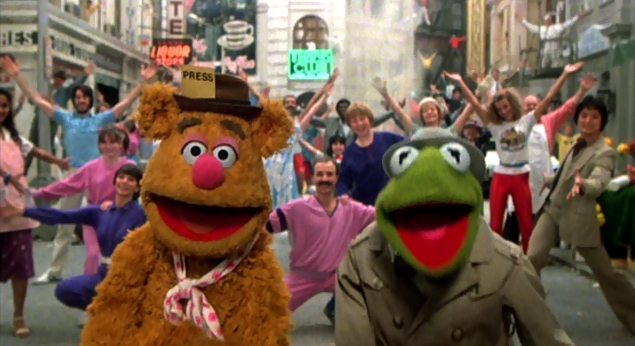
Accompanied by The Great Gonzo, their staff photographer, Kermit and Fozzy travel to London in the luggage department of a plane where they are thrown off the plane over London while the plane continues to Italy. Kermit goes to Lady Holiday's office and meets her receptionist (Miss Piggy), who pretends to be Lady Holiday and, of course, the romantic sparks fly while Kermit and Fozzy try to get to the bottom of the thefts while Nicky and his girls attempt to frame Miss Piggy for their crimes.

A writing and performing team since the 1960's Tom Patchett and Jay Tarses have constructed a near brilliant comic story that, in the best tradition of Mel Brooks and the Zucker brothers, consistently breaks the fourth wall, never allowing the viewer to think that anything they are about to see is real. Even during the opening credits, we observe Fozzie, Kermit, and Gonzo in a hot air balloon discussing the opening credits as they flash up on the screen right next to them. When Lady Holiday gregariously offers her life story to Miss Piggy and Piggy asks why, Lady Holiday explains that "it's plot exposition...it has to go somewhere." This story is so smart and slick that it's hard to believe that children were the intended demographic for this movie...how many kids do you know who know what plot exposition is?

The movie also finds some roots in movie musicals from the 30's and 40's with a lavish production number called "The First Time it Happens" that conjure memories of Busby Berkley and an elaborate water ballet that anyone who has ever seen an Esther Williams movie will love. Joe Raposo's kicky song score also includes "The Happiness Hotel", "Steppin Out with a Star", "Couldn't We Ride", and "Night Life" The elaborate choreography is provided by Anita Mann.
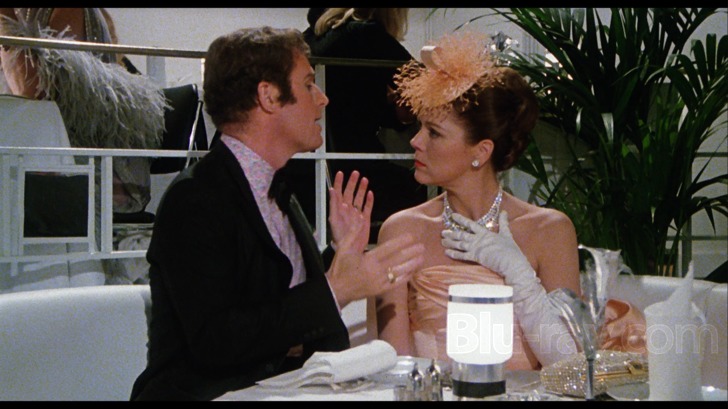
Diana Rigg is delicious perfection as the theatrical Lady Holiday and Charles Grodin is funny as her brother Nicky, though I thought it was odd that, playing Rigg's brother with an all-English cast, that Grodin doesn't even attempt an accent. As always with Muppet movies, cameos offered along the way include Jack Warden, Robert Morley, John Cleese, Peter Falk, Peter Ustinov, and the film's director, the one and only Jim Henson. A comic adventure based on nothing realistic that had me doubled over with laughter.
Jim Hensen and company knock it out of the park with their 1981 musical fantasy The Great Muppet Caper, a comic romp that constantly reminds the viewer it's only a movie and had me rolling on the floor from opening to closing credits.

In another completely unbelievable tell for entertainment's funniest rep company, Kermit the Frog and Fozzie Bear play investigative reporters and identical twins (don't ask) who decide to go to London when word reaches them from across the pond that Lady Holiday (Diana Rigg) has had a very expensive necklace stolen from her. It turns out that the necklace was really stolen by Lady Holiday's greasy younger brother, Nicky (Charles Grodin) and three of the Lady's models who hate her. They are now planning to steal Lady Holiday's most prized possession: a huge gem known as the Baseball Diamond.

Accompanied by The Great Gonzo, their staff photographer, Kermit and Fozzy travel to London in the luggage department of a plane where they are thrown off the plane over London while the plane continues to Italy. Kermit goes to Lady Holiday's office and meets her receptionist (Miss Piggy), who pretends to be Lady Holiday and, of course, the romantic sparks fly while Kermit and Fozzy try to get to the bottom of the thefts while Nicky and his girls attempt to frame Miss Piggy for their crimes.

A writing and performing team since the 1960's Tom Patchett and Jay Tarses have constructed a near brilliant comic story that, in the best tradition of Mel Brooks and the Zucker brothers, consistently breaks the fourth wall, never allowing the viewer to think that anything they are about to see is real. Even during the opening credits, we observe Fozzie, Kermit, and Gonzo in a hot air balloon discussing the opening credits as they flash up on the screen right next to them. When Lady Holiday gregariously offers her life story to Miss Piggy and Piggy asks why, Lady Holiday explains that "it's plot exposition...it has to go somewhere." This story is so smart and slick that it's hard to believe that children were the intended demographic for this movie...how many kids do you know who know what plot exposition is?

The movie also finds some roots in movie musicals from the 30's and 40's with a lavish production number called "The First Time it Happens" that conjure memories of Busby Berkley and an elaborate water ballet that anyone who has ever seen an Esther Williams movie will love. Joe Raposo's kicky song score also includes "The Happiness Hotel", "Steppin Out with a Star", "Couldn't We Ride", and "Night Life" The elaborate choreography is provided by Anita Mann.

Diana Rigg is delicious perfection as the theatrical Lady Holiday and Charles Grodin is funny as her brother Nicky, though I thought it was odd that, playing Rigg's brother with an all-English cast, that Grodin doesn't even attempt an accent. As always with Muppet movies, cameos offered along the way include Jack Warden, Robert Morley, John Cleese, Peter Falk, Peter Ustinov, and the film's director, the one and only Jim Henson. A comic adventure based on nothing realistic that had me doubled over with laughter.
X
Favorite Movies
X
User Lists
What Dreams May Come
Despite overly melodramatic direction, 1998's What Dreams May Come is an imaginative and visually arresting take on some unsavory and squirm-worthy subject matter that takes a dark and emotionally charged journey to a satisfactory, if logic-defying finale.

Robin Williams plays Chris Nielsen, a doctor, husband, and father of two whose children are killed in an accident. Four years later, Chris also dies in an accident. Chris finds himself transported into a concept of heaven that's like a visual painting that he embraces until he receives word that his wife (Annabella Sciorra) has committed suicide, but she is not coming to heaven, she has gone to hell and Chris makes the fatalistic decision to journey to hell to get his wife back.
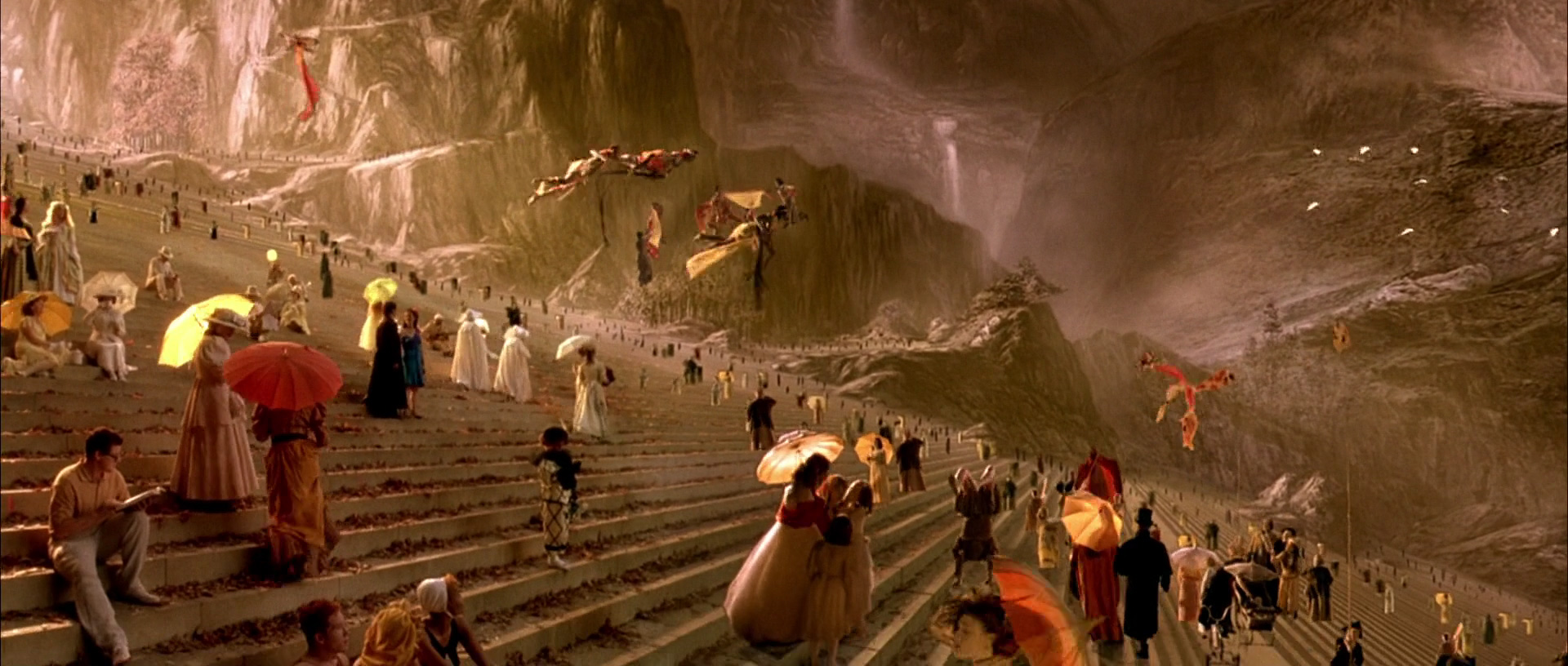
Based on a novel by Richard Matheson, Ronald Bass' screenplay is unapologetic in its in your face confrontation on subjects like death, dying, heaven, hell, eternal life, and most disturbing, the concept of suicide sending someone to hell instead of heaven. An explanation for this radical concept is provided, but it was weak and did not justify this woman going to hell after what she had been through. The story promises Chris that he will be reunited with his children and a journey to hell might lead him back to his wife, but she won't know who he is. Why have him reunite with his kids and deprive him of his wife? Though the scene where Chris finds his wife and tries to get through to her is one of the movie's most powerful moments.

Director Vincent Ward overpowers some of the ugliness of the story through some extraordinary visuals that actually give the after life appeal. Chris' initial arrival in Heaven is eye popping with colors that look like an artists' palette and the paint takes on three dimensions as the ground Chris walks on appears to be paint. And as breathtaking as Ward's vision of heaven is, his vision of hell reaches the opposite side of the spectrum, bringing a proper darkness and ugliness to hell, without devils and pitchforks and fire...there's an absolutely repellent moment where Chris must navigate through a sea of human heads that defies description. After this hellacious journey, the convenient ending is a bit of a cheat.

Robin Williams hits all the right notes as the tortured Chris and Cuba Gooding Jr. and Max Von Sydow are also effective as Chris' guides through heaven and hell. And though I have always found her overrated as an actress, I have never enjoyed Sciorra more as the luminous and lost Annie. The film also scores in the areas of production design, cinematography, film editing, and sound. It takes a minute to get going and the ending is a little convenient, but most of this is imaginative and a little creepy.
Despite overly melodramatic direction, 1998's What Dreams May Come is an imaginative and visually arresting take on some unsavory and squirm-worthy subject matter that takes a dark and emotionally charged journey to a satisfactory, if logic-defying finale.

Robin Williams plays Chris Nielsen, a doctor, husband, and father of two whose children are killed in an accident. Four years later, Chris also dies in an accident. Chris finds himself transported into a concept of heaven that's like a visual painting that he embraces until he receives word that his wife (Annabella Sciorra) has committed suicide, but she is not coming to heaven, she has gone to hell and Chris makes the fatalistic decision to journey to hell to get his wife back.

Based on a novel by Richard Matheson, Ronald Bass' screenplay is unapologetic in its in your face confrontation on subjects like death, dying, heaven, hell, eternal life, and most disturbing, the concept of suicide sending someone to hell instead of heaven. An explanation for this radical concept is provided, but it was weak and did not justify this woman going to hell after what she had been through. The story promises Chris that he will be reunited with his children and a journey to hell might lead him back to his wife, but she won't know who he is. Why have him reunite with his kids and deprive him of his wife? Though the scene where Chris finds his wife and tries to get through to her is one of the movie's most powerful moments.

Director Vincent Ward overpowers some of the ugliness of the story through some extraordinary visuals that actually give the after life appeal. Chris' initial arrival in Heaven is eye popping with colors that look like an artists' palette and the paint takes on three dimensions as the ground Chris walks on appears to be paint. And as breathtaking as Ward's vision of heaven is, his vision of hell reaches the opposite side of the spectrum, bringing a proper darkness and ugliness to hell, without devils and pitchforks and fire...there's an absolutely repellent moment where Chris must navigate through a sea of human heads that defies description. After this hellacious journey, the convenient ending is a bit of a cheat.

Robin Williams hits all the right notes as the tortured Chris and Cuba Gooding Jr. and Max Von Sydow are also effective as Chris' guides through heaven and hell. And though I have always found her overrated as an actress, I have never enjoyed Sciorra more as the luminous and lost Annie. The film also scores in the areas of production design, cinematography, film editing, and sound. It takes a minute to get going and the ending is a little convenient, but most of this is imaginative and a little creepy.
X
Favorite Movies
X